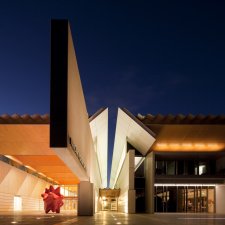- About us
- Support the Gallery
- Venue hire
- Publications
- Research library
- Organisation chart
- Employment
- Contact us
- Make a booking
- Onsite programs
- Online programs
- School visit information
- Learning resources
- Little Darlings
- Professional learning
Ian Fairweather (1891-1974), painter, grew up in Scotland, where he trained as an army officer. Not long into World War 1 he was captured by Germans in France; he was to spend the next four years as a prisoner of war, studying Japanese and drawing. After the war he spent four years at London's Slade School, studying Japanese and Chinese by night, before embarking on lengthy travels though Asia and India. He arrived in Melbourne in 1934 and his extraordinary ability was immediately recognised by Gino Nibbi, Lina Bryans and others; but in the midst of painting a mural on brown paper for the Menzies Hotel, he left for the Philippines. Having served with the British army in India he returned to Australia, travelling before settling in Lina Bryans's artists' enclave at Darebin. Although there had been many periods in which he could not afford paint and tried to work with odd materials that 'mostly fell off', by the end of World War 2 his paintings had been acquired by the London Contemporary Art Society, the Tate and the Leicester Gallery, and had been exhibited in British Painting since Whistler and the Exhibition of 20th Century Art at the National Gallery in London. Fairweather moved to Queensland in 1947, and went from there to Darwin, whence, after living in the hulk of a boat on the beach, he set out for Timor in 1952. He nearly died on the journey, but was nonetheless deported to England, where he served hard labour before returning to Brisbane in 1953. Eight years earlier, he had sailed a life raft to Bribie Island and stayed there for seven months. He returned to the island, built a Malay-style dwelling and lived there alone until his death. In his hut, working with synthetic polymer on cardboard, he painted the multilayered, dull-coloured works, teeming with his accreted influences, which won him his renown as one of Australia's greatest abstractionists.
Collection: National Portrait Gallery
Gift of David Crooke 2011
Donated through the Australian Government's Cultural Gifts Program
© Ray Crooke/Copyright Agency, 2024
David Crooke (2 portraits)



On one level The Companion talks about the most famous and frontline Australians, but on another it tells us about ourselves.



Visit us, learn with us, support us or work with us! Here’s a range of information about planning your visit, our history and more!



We depend on your support to keep creating our programs, exhibitions, publications and building the amazing portrait collection!